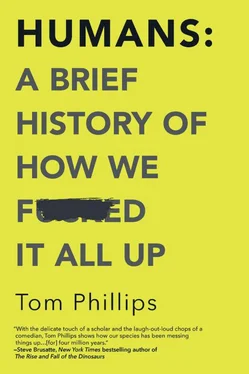Tom Phillips - Humans - A Brief History of How We F*cked It All Up
Здесь есть возможность читать онлайн «Tom Phillips - Humans - A Brief History of How We F*cked It All Up» весь текст электронной книги совершенно бесплатно (целиком полную версию без сокращений). В некоторых случаях можно слушать аудио, скачать через торрент в формате fb2 и присутствует краткое содержание. Город: Toronto, Год выпуска: 2019, ISBN: 2019, Издательство: Hanover Square Press, Жанр: История, Юмористические книги, на английском языке. Описание произведения, (предисловие) а так же отзывы посетителей доступны на портале библиотеки ЛибКат.
- Название:Humans: A Brief History of How We F*cked It All Up
- Автор:
- Издательство:Hanover Square Press
- Жанр:
- Год:2019
- Город:Toronto
- ISBN:978-1-48805-113-5
- Рейтинг книги:4 / 5. Голосов: 1
-
Избранное:Добавить в избранное
- Отзывы:
-
Ваша оценка:
- 80
- 1
- 2
- 3
- 4
- 5
Humans: A Brief History of How We F*cked It All Up: краткое содержание, описание и аннотация
Предлагаем к чтению аннотацию, описание, краткое содержание или предисловие (зависит от того, что написал сам автор книги «Humans: A Brief History of How We F*cked It All Up»). Если вы не нашли необходимую информацию о книге — напишите в комментариях, мы постараемся отыскать её.
Humans: A Brief History of How We F*cked It All Up — читать онлайн бесплатно полную книгу (весь текст) целиком
Ниже представлен текст книги, разбитый по страницам. Система сохранения места последней прочитанной страницы, позволяет с удобством читать онлайн бесплатно книгу «Humans: A Brief History of How We F*cked It All Up», без необходимости каждый раз заново искать на чём Вы остановились. Поставьте закладку, и сможете в любой момент перейти на страницу, на которой закончили чтение.
Интервал:
Закладка:
So it’s worth remembering that Hitler was actually an incompetent, lazy egomaniac and his government was an absolute clown show.
In fact, this may even have helped his rise to power, as he was consistently underestimated by the German elite. Before he became chancellor, many of his opponents had dismissed him as a joke for his crude speeches and tacky rallies. He was a “pathetic dunderhead” according to one magazine editor; another wrote that his party was a “society of incompetents” and that people should not “overestimate the fairground party.”
Even after elections had made the Nazis the largest party in the Reichstag, people still kept thinking that Hitler was an easy mark, a blustering idiot who could easily be controlled by smart people. Franz von Papen, the recently removed Chancellor of Germany, who was bitterly determined to reclaim power, thought that he could use Hitler as a pawn, and so entered into discussions with him to form a coalition government. After the deal was done in January 1933, making Hitler chancellor and von Papen vice chancellor, with a cabinet full of the latter’s conservative allies, von Papen was confident of his triumph. “We’ve hired him,” he reassured an acquaintance who tried to warn him he’d made a mistake. “In two months,” he predicted to another friend, “we’ll have pushed Hitler so far into a corner he’ll squeak.”
That’s not how it worked out. In fact, within two months, Hitler had seized complete control of the German state, persuading the Reichstag to pass an act that gave him power to bypass the constitution, the presidency and the Reichstag itself. What had been a democracy was, suddenly, not a democracy anymore.
Why did the elites of Germany so consistently underestimate Hitler? Possibly because they weren’t actually wrong in their assessment of his competency—they just failed to realize that this wasn’t enough to stand in the way of his ambition. As it would turn out, Hitler was really bad at running a government. As his own press chief, Otto Dietrich, later wrote in his memoir The Hitler I Knew , “In the twelve years of his rule in Germany, Hitler produced the biggest confusion in government that has ever existed in a civilized state.”
Hitler hated having to read paperwork, and would regularly make important decisions without even looking at the documents his aides had prepared for him. Rather than having policy discussions with his underlings, he’d subject them to impromptu rambling speeches about whatever was on his mind—which they dreaded, as it would mean no more work could be done until he was finished.
His government was constantly in chaos, with officials having no idea what he wanted them to do, and nobody was entirely clear who was actually in charge of what. He procrastinated wildly when asked to make difficult decisions, and would often end up relying on gut feeling, leaving even close allies in the dark about his plans. His “unreliability had those who worked with him pulling out their hair,” as his confidant Ernst Hanfstaengl later wrote in his memoir Zwischen Weißem und Braunem Haus . This meant that rather than carrying out the duties of state, they spent most of their time in-fighting and backstabbing each other in an attempt to either win his approval or avoid his attention altogether, depending on what mood he was in that day.
There’s a bit of an argument among historians about whether this was a deliberate ploy on Hitler’s part to get his own way, or whether he was just really, really bad at being in charge of stuff. Dietrich himself came down on the side of it being a cunning tactic to sow division and chaos—and it’s undeniable that he was very effective at that. But when you look at Hitler’s personal habits, it’s hard to shake the feeling that it was just a natural result of putting a work-shy narcissist in charge of a country.
Hitler was incredibly lazy. According to his aide Fritz Wiedemann, even when he was in Berlin he wouldn’t get out of bed until after 11:00 a.m., and wouldn’t do much before lunch other than read what the newspapers had to say about him, the press cuttings being dutifully delivered to him by Dietrich. But he didn’t even enjoy being in Berlin, where people kept on trying to get him to do stuff: he’d take any opportunity to leave the seat of government and go to his private country retreat in the Obersalzberg, where he’d do even less. There, he wouldn’t even leave his room until 2:00 p.m., and he spent most of his time taking walks, or watching movies until the small hours of the morning.
He was obsessed with the media and celebrity, and often seems to have viewed himself through that lens. He once described himself as “the greatest actor in Europe,” and wrote to a friend, “I believe my life is the greatest novel in world history.” In many of his personal habits he came across as strange or even childish—he would have regular naps during the day, he would bite his fingernails at the dinner table and he had a remarkably sweet tooth that led him to eat “prodigious amounts of cake” and “put so many lumps of sugar in his cup that there was hardly any room for the tea.”
He was deeply insecure about his own lack of knowledge, preferring to either ignore information that contradicted his preconceptions, or to lash out at the expertise of others—he was said to “rage like a tiger” if anybody corrected him. “How can one tell someone the truth who immediately gets angry when the facts do not suit him?” lamented Wiedemann. He hated being laughed at, but enjoyed it when other people were the butt of the joke (he would perform mocking impressions of people he disliked). But he also craved the approval of those he disdained, and his mood would quickly improve if a newspaper wrote something complimentary about him.
Little of this was especially secret or unknown at the time. It’s why so many people failed to take Hitler seriously until it was too late, dismissing him as merely a “half-mad rascal” or a “man with a beery vocal organ.” In a sense, they weren’t wrong. In another, much more important sense, they were as wrong as it’s possible to get. Hitler’s personal failings didn’t stop him having an uncanny instinct for political rhetoric that would gain mass appeal, and it turns out you don’t actually need to have a particularly competent or functional government to do terrible things.
We tend to assume that when something awful happens there must have been some great controlling intelligence behind it. It’s understandable: How could things have gone so wrong, we think, if there wasn’t an evil genius pulling the strings? The downside of this is that we tend to assume that if we can’t immediately spot an evil genius, then we can all chill out a bit because everything will be fine .
But history suggests that’s a mistake, and it’s one that we make over and over again. Many of the worst man-made events that ever occurred were not the product of evil geniuses. Instead, they were the product of a parade of idiots and lunatics, incoherently flailing their way through events, helped along the way by overconfident people who thought they could control them.
The smartest minds in Margaret Thatcher’s government came up with what they thought a fairer tax: one where everybody, rich or poor, paid the same. It led to widespread nonpayment, large-scale riots and eventually Thatcher was forced to resign.
America’s efforts to ban the drinking of alcohol between 1920 and 1933 did lead to fewer people drinking—but it also allowed organized crime to monopolize the alcohol industry, making crime soar in many places.
Читать дальшеИнтервал:
Закладка:
Похожие книги на «Humans: A Brief History of How We F*cked It All Up»
Представляем Вашему вниманию похожие книги на «Humans: A Brief History of How We F*cked It All Up» списком для выбора. Мы отобрали схожую по названию и смыслу литературу в надежде предоставить читателям больше вариантов отыскать новые, интересные, ещё непрочитанные произведения.
Обсуждение, отзывы о книге «Humans: A Brief History of How We F*cked It All Up» и просто собственные мнения читателей. Оставьте ваши комментарии, напишите, что Вы думаете о произведении, его смысле или главных героях. Укажите что конкретно понравилось, а что нет, и почему Вы так считаете.












